高一英语Module 6 The Internet and Telecommunications知识点解析外研版必修1
文档属性
| 名称 | 高一英语Module 6 The Internet and Telecommunications知识点解析外研版必修1 |
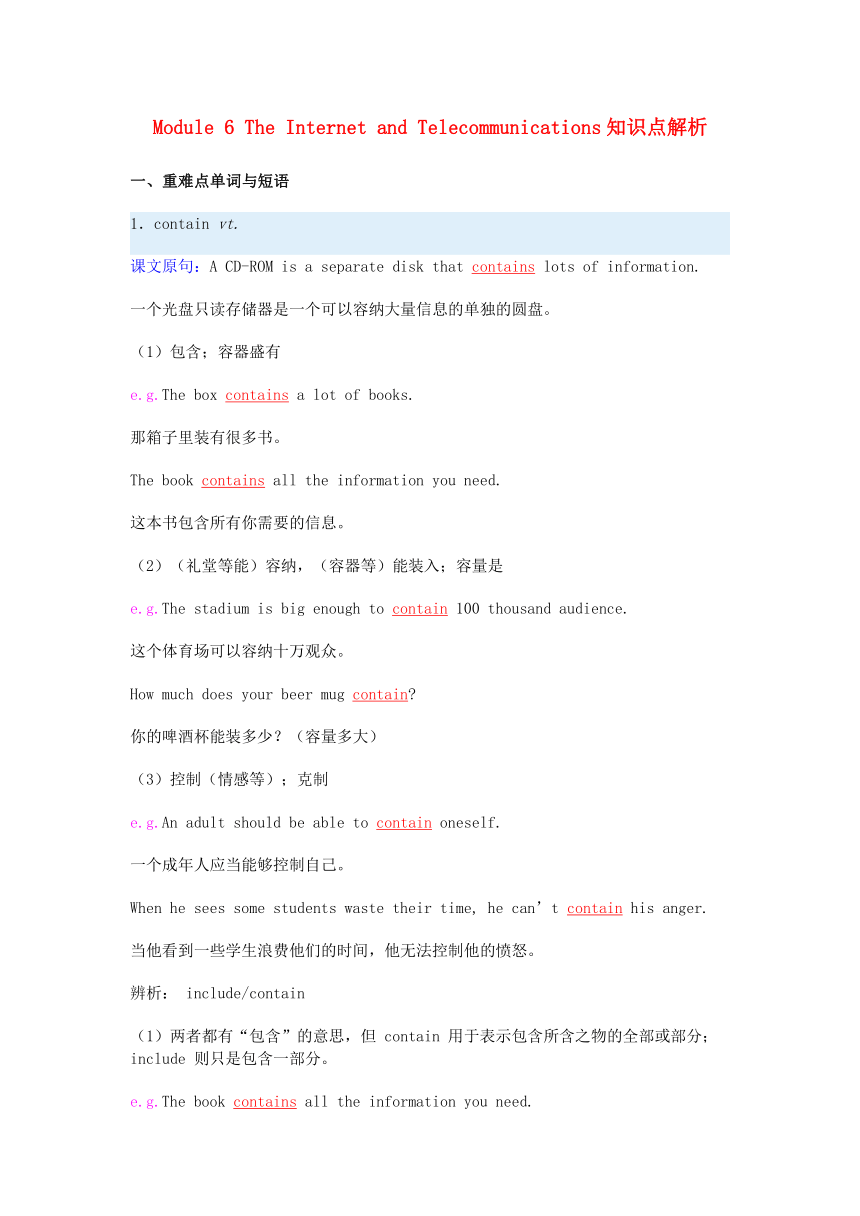
|
|
| 格式 | zip | ||
| 文件大小 | 23.2KB | ||
| 资源类型 | 教案 | ||
| 版本资源 | 外研版 | ||
| 科目 | 英语 | ||
| 更新时间 | 2013-06-18 00:00:00 | ||
图片预览

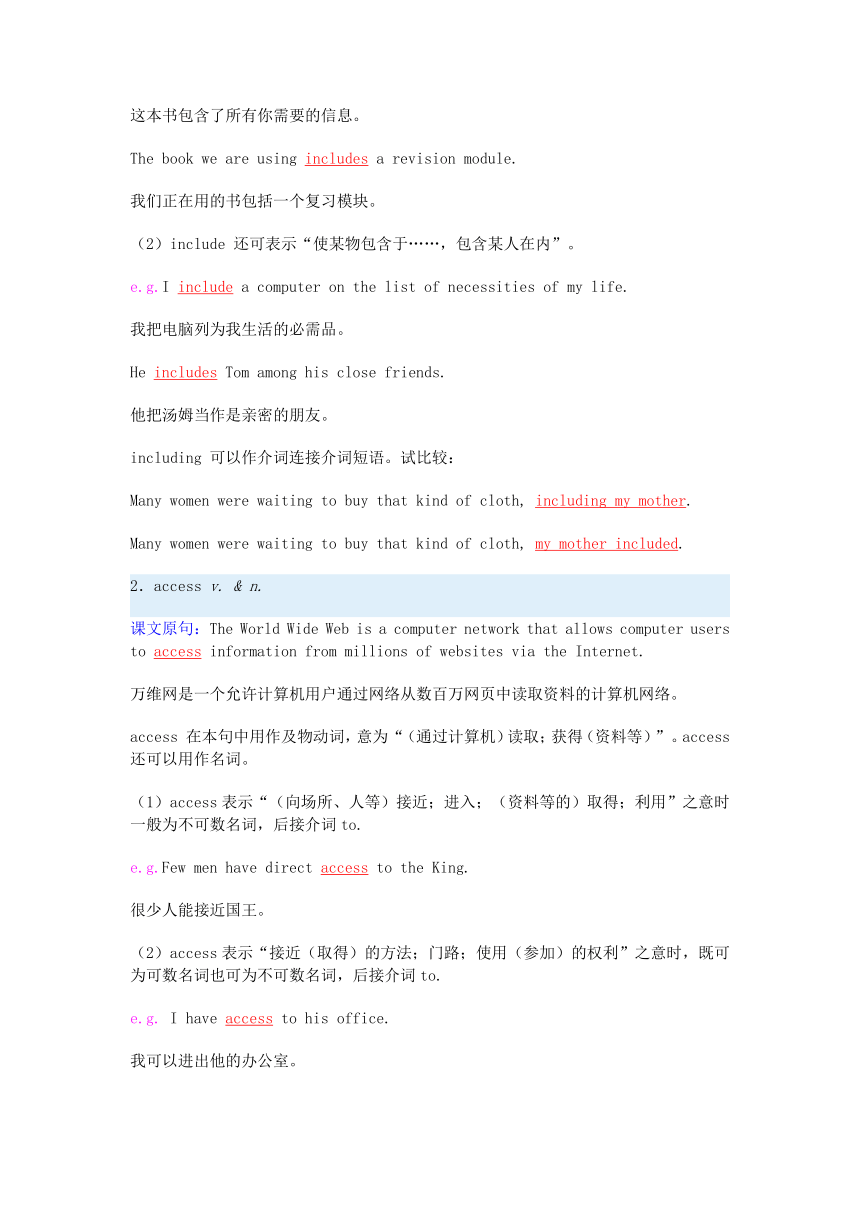
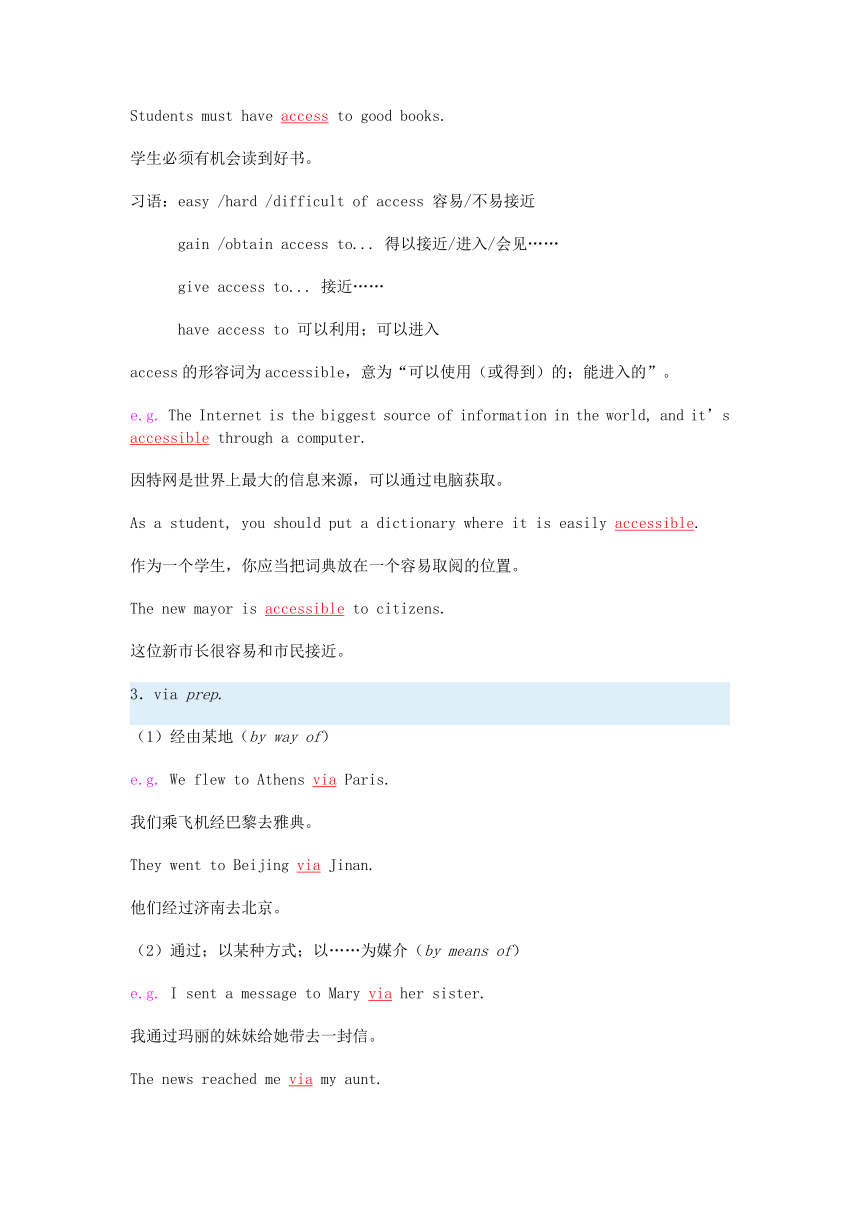
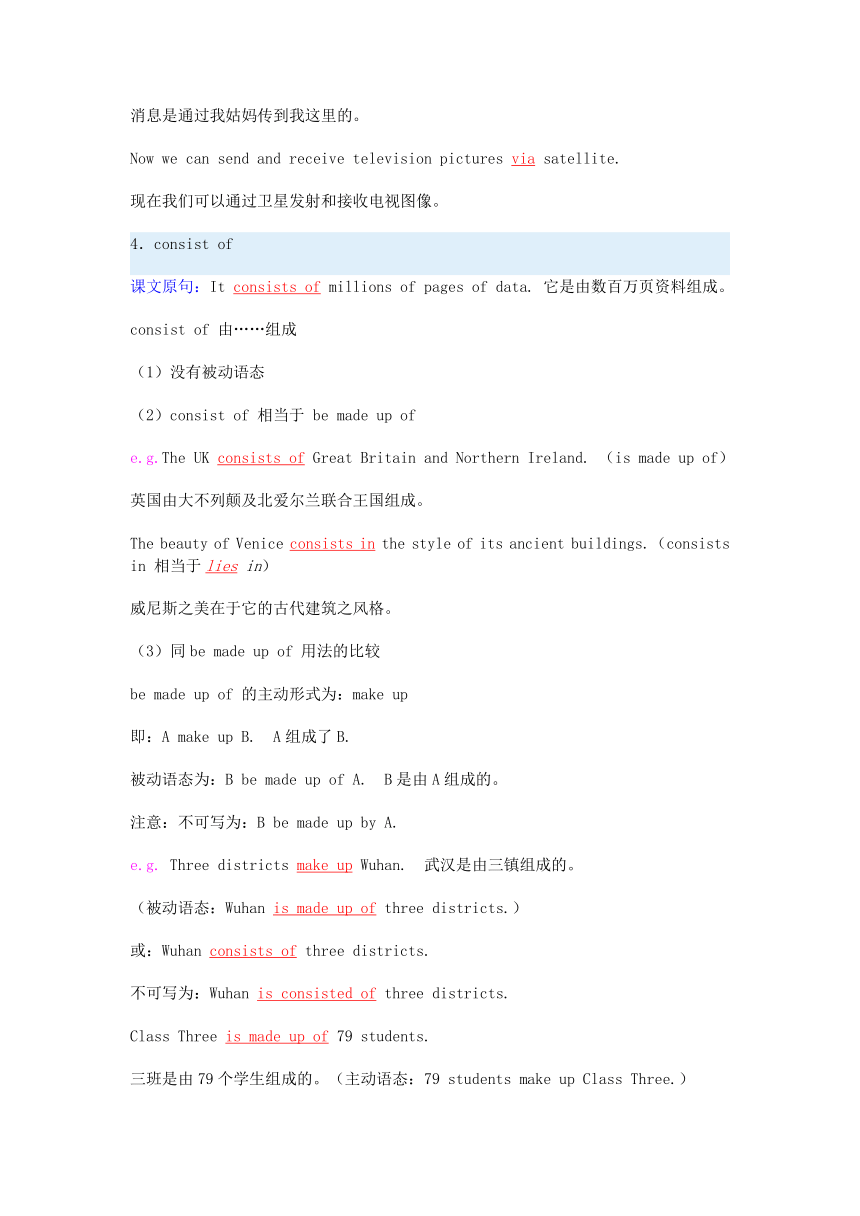
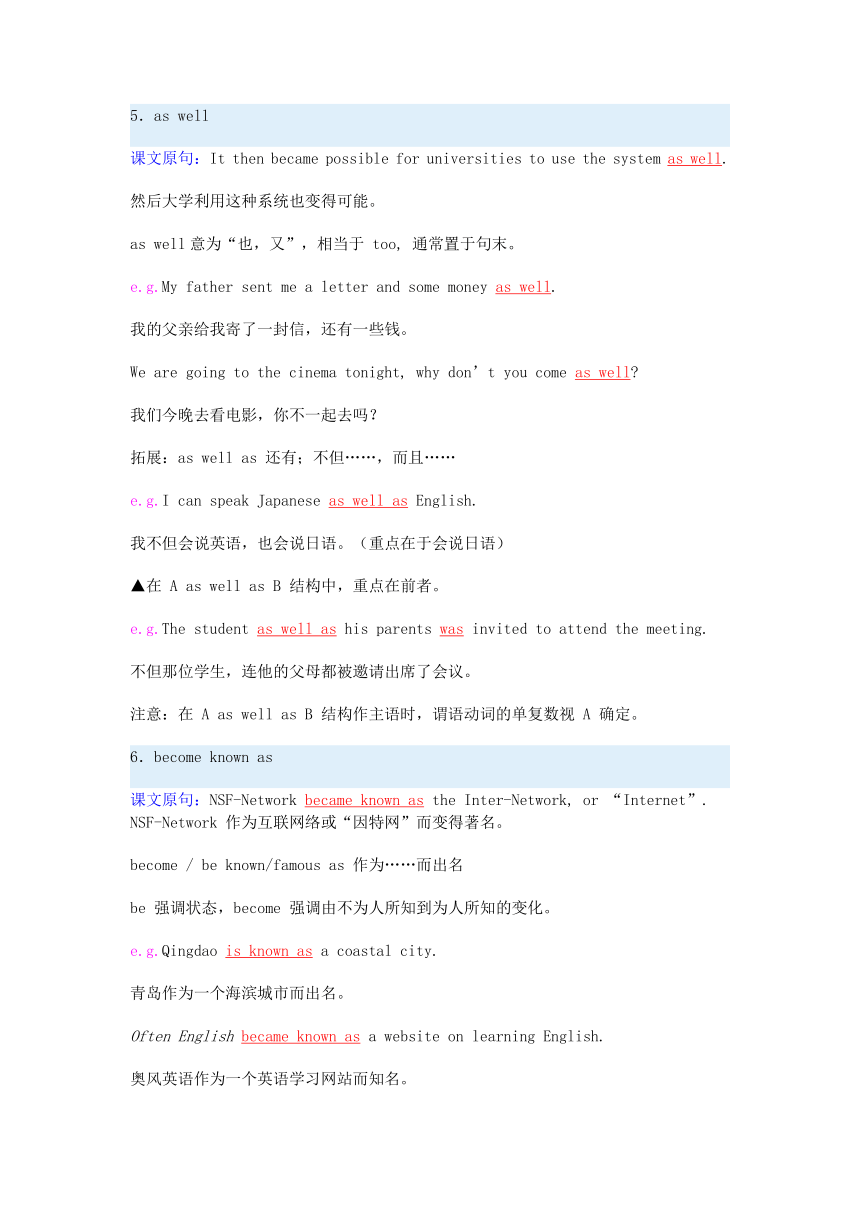
文档简介
Module 6 The Internet and Telecommunications知识点解析
一、重难点单词与短语
1.contain vt.
课文原句:A CD-ROM is a separate disk that contains lots of information.
一个光盘只读存储器是一个可以容纳大量信息的单独的圆盘。
(1)包含;容器盛有
e.g.The box contains a lot of books.
那箱子里装有很多书。
The book contains all the information you need.
这本书包含所有你需要的信息。
(2)(礼堂等能)容纳,(容器等)能装入;容量是
e.g.The stadium is big enough to contain 100 thousand audience.
这个体育场可以容纳十万观众。
How much does your beer mug contain
你的啤酒杯能装多少?(容量多大)
(3)控制(情感等);克制
e.g.An adult should be able to contain oneself.
一个成年人应当能够控制自己。
When he sees some students waste their time, he can’t contain his anger.
当他看到一些学生浪费他们的时间,他无法控制他的愤怒。
辨析: include/contain
(1)两者都有“包含”的意思,但 contain 用于表示包含所含之物的全部或部分;include 则只是包含一部分。
e.g.The book contains all the information you need.
这本书包含了所有你需要的信息。
The book we are using includes a revision module.
我们正在用的书包括一个复习模块。
(2)include 还可表示“使某物包含于……,包含某人在内”。
e.g.I include a computer on the list of necessities of my life.
我把电脑列为我生活的必需品。
He includes Tom among his close friends.
他把汤姆当作是亲密的朋友。
including 可以作介词连接介词短语。试比较:
Many women were waiting to buy that kind of cloth, including my mother.
Many women were waiting to buy that kind of cloth, my mother included.
2.access v. & n.
课文原句:The World Wide Web is a computer network that allows computer users to access information from millions of websites via the Internet.
万维网是一个允许计算机用户通过网络从数百万网页中读取资料的计算机网络。
access 在本句中用作及物动词,意为“(通过计算机)读取;获得(资料等)”。access还可以用作名词。
(1)access表示“(向场所、人等)接近;进入;(资料等的)取得;利用”之意时一般为不可数名词,后接介词to.
e.g.Few men have direct access to the King.
很少人能接近国王。
(2)access表示“接近(取得)的方法;门路;使用(参加)的权利”之意时,既可为可数名词也可为不可数名词,后接介词to.
e.g. I have access to his office.
我可以进出他的办公室。
Students must have access to good books.
学生必须有机会读到好书。
习语:easy /hard /difficult of access 容易/不易接近
gain /obtain access to... 得以接近/进入/会见……
give access to... 接近……
have access to 可以利用;可以进入
access的形容词为accessible,意为“可以使用(或得到)的;能进入的”。
e.g. The Internet is the biggest source of information in the world, and it’s accessible through a computer.
因特网是世界上最大的信息来源,可以通过电脑获取。
As a student, you should put a dictionary where it is easily accessible.
作为一个学生,你应当把词典放在一个容易取阅的位置。
The new mayor is accessible to citizens.
这位新市长很容易和市民接近。
3.via prep.
(1)经由某地(by way of)
e.g. We flew to Athens via Paris.
我们乘飞机经巴黎去雅典。
They went to Beijing via Jinan.
他们经过济南去北京。
(2)通过;以某种方式;以……为媒介(by means of)
e.g. I sent a message to Mary via her sister.
我通过玛丽的妹妹给她带去一封信。
The news reached me via my aunt.
消息是通过我姑妈传到我这里的。
Now we can send and receive television pictures via satellite.
现在我们可以通过卫星发射和接收电视图像。
4.consist of
课文原句:It consists of millions of pages of data. 它是由数百万页资料组成。
consist of 由……组成
(1)没有被动语态
(2)consist of 相当于 be made up of
e.g.The UK consists of Great Britain and Northern Ireland. (is made up of)
英国由大不列颠及北爱尔兰联合王国组成。
The beauty of Venice consists in the style of its ancient buildings.(consists in 相当于lies in)
威尼斯之美在于它的古代建筑之风格。
(3)同be made up of 用法的比较
be made up of 的主动形式为:make up
即:A make up B. A组成了B.
被动语态为:B be made up of A. B是由A组成的。
注意:不可写为:B be made up by A.
e.g. Three districts make up Wuhan. 武汉是由三镇组成的。
(被动语态:Wuhan is made up of three districts.)
或:Wuhan consists of three districts.
不可写为:Wuhan is consisted of three districts.
Class Three is made up of 79 students.
三班是由79个学生组成的。(主动语态:79 students make up Class Three.)
5.as well
课文原句:It then became possible for universities to use the system as well.
然后大学利用这种系统也变得可能。
as well意为“也,又”,相当于 too, 通常置于句末。
e.g.My father sent me a letter and some money as well.
我的父亲给我寄了一封信,还有一些钱。
We are going to the cinema tonight, why don’t you come as well
我们今晚去看电影,你不一起去吗?
拓展:as well as 还有;不但……,而且……
e.g.I can speak Japanese as well as English.
我不但会说英语,也会说日语。(重点在于会说日语)
▲在 A as well as B 结构中,重点在前者。
e.g.The student as well as his parents was invited to attend the meeting.
不但那位学生,连他的父母都被邀请出席了会议。
注意:在 A as well as B 结构作主语时,谓语动词的单复数视 A 确定。
6.become known as
课文原句:NSF-Network became known as the Inter-Network, or “Internet”. NSF-Network 作为互联网络或“因特网”而变得著名。
become / be known/famous as 作为……而出名
be 强调状态,become 强调由不为人所知到为人所知的变化。
e.g.Qingdao is known as a coastal city.
青岛作为一个海滨城市而出名。
Often English became known as a website on learning English.
奥风英语作为一个英语学习网站而知名。
拓展:
★be known/famous for 以/因……而出名
e.g.Jiuzhaigou is known for its beautiful scenery.
九寨沟以它的美丽景色而闻名。
The place is known for its fruit, especially its seedless grapes.
这个地方因其水果而闻名,尤其是无籽葡萄。
★be known to 为……所熟知
e.g.He is known to the police.
他是警察所熟知的罪犯。
It is known to us all that theory comes from practice.
众所周知理论来自实践。
7.go down
课文原句:At the moment, about 80 percentage of web traffic is in English, but this percentage is going down.
现在,百分之八十的网络信息是英文的,但是这一比例正在下降。
go down ( 价格、价值、程度、数量等 ) 下降;降低
e.g.It is said that the price of salt will go down.
据说盐的价格要下降。
He has gone down in my opinion since I discovered his dishonesty.
自从我发现他的不诚实后,他在我心目中的形象下降了。
Her temperature has gone down.
她的体温已经降下来了。
8.come up with
课文原句:He came up with the idea of the World Wide Web in 1989 while he was working in Switzerland.
1989年在瑞士工作时,他产生了互联网的想法。
come up with 赶上;想出,提出;找出(答案、计划等)
e.g.He’s come up with his classmates ahead of him, after months of patient diligence.
经过几个月坚持不懈的努力,他赶上了前面的同学。
The policeman came up with the robber.
那位警察追上了劫匪。
She came up with a new suggestion to solve the problem as well.
她也提出了一项解决问题的新建议。
We have to come up with the practical measures to prevent the air pollution.
我们必须找到防止空气污染的切实可行的办法。
It’s wonderful for you to come up with such a good idea.
你能想出这样一个好主意,太棒了!
9.concentrate on
课文原句:Concentrate on the good things about the Internet.
用心思考互联网的益处。
concentrate on/upon 集中精力、思想于(某事上);专心做;专注于
e.g.I must concentrate on my new task.
我必须专注于我的新任务。
She is too distracted to concentrate properly on her study.
她过于心烦意乱,无法集中精力学习。
A driver should concentrate on the road when driving.
开车时驾驶员的注意力要集中在路上。
10.compared with
课文原句:Two percent of the total population of China have access to the Internet, compared with 45 percent in the USA and 15 percent in Japan.
比起美国的百分之四十五和日本的百分之十五,中国上网人数只有总人口的百分之二。
compared with/to 与……比起来
e.g. Statistics show a 20% reduction in traffic accident compared with last year.
数据显示,交通事故比去年下降了百分之二十。
Compared with Tom's composition, hers is really well done.
与汤姆的作文比起来,她的真的写的不错。
二、句子解析
1.It then became possible for universities to use the system as well.
然后大学利用这种系统也变得可能。
句型“It be /become +adj.+ for sb./sth. to do sth.”中的形容词通常强调不定式的行为属性,如:important, possible, impossible, necessary, difficult, hard, reasonable等。
e.g.It’s difficult for us to finish the work within two hours.
我们要在两小时之内完成工作是很难的。
It’s reasonable for them to run away so quickly.
他们这么快就逃跑了是很有道理的。
It is important for the students to learn English well.
对学生们来说学好英语很重要。
注意:句型“It be + adj. + of sb. + to do sth.”中的形容词多是表示人物性格和特征。如:kind, silly, good, unwise, clever, wrong, right, foolish, stupid, careless, rude, impolite, bold, thoughtful, honest, bad, sensible, naughty等。
e.g.It’s kind of you to think so much of us.
难为你这么为我们着想。
It’s silly of the boy to keep pouring water into the basket.
这个男孩真傻,一直往篮子里倒水。
上两句型中it是作形式主语,后面的动词不定式短语是真正的主语。
2.At the moment,about 80 percent of web traffic is in English,but this percentage is going down.
目前,大约有80%的网络用英语,但这个百分比正在下降。
(1)at the moment=at the present time;now 此刻;现在
e.g.The number is engaged at the moment. Try again later.
这个号现在占线,随后再试试吧。
(2)百分数的表达法:百分数由“基数词+percent (per cent ) 构成”。如:53%读作fifty—three percent,应注意的是percent不能用复数形式。若百分数部分用作主语,其谓语动词要依其后的名词意义来决定。
e.g.About sixty percent of the apple is bad.
这个苹果约60%坏了。
About sixty percent of apples are bad.
这些苹果中约60%坏了。
I think it’s ninety percent probable.
我想有90%的可能。
注意:用percent构成的短语作主语时,谓语动词应根据of后的名词确定。
3.Berners-Lee built his first computer while he was at university using an old television!
读大学时,贝尔纳斯·李利用一台旧式电视机制成了他的第一台电脑。
本句中的using an old television是动词-ing充当方式状语。
现在分词在句中作状语可以表示为以下几种情况:
(1)时间状语
e.g.While reading the book, he nodded from time to time.
他一边看书,一边不时地点头。
(2)条件或让步状语
e.g.Staying here for some time, you'll find the people here are friendly.
若在此呆上一段时间,你会发现这里的人们很友好。
Knowing all this, they made me pay for the damage.
尽管知道了一切情况,他们还是要我赔偿损失。
(3)原因状语
e.g.Not knowing his address, I can’t send this book to him.
因为不知道他的地址,我不能把这本书送给他。
(4)伴随状语
e.g.He sat in the armchair, reading the newspaper.
他坐在扶手椅上读报纸。
They stood there for half an hour watching the stars in the sky.
他们在那儿站了半小时,观察着天上的星星。
4.Berners-Lee made it possible for everyone to use the Internet, no just universities and the army.
贝尔纳斯·李使所有人不仅是大学和军队使用“因特网”成为可能。
make it possible for everyone to use…中it作形式宾语,possible是形容词作宾补,to use是不定式短语作真正的宾语。
e.g.Modern technology has made it possible to fly in space.
现代技术使得在太空飞行成为可能。
We find it necessary for us to grasp another foreign language.
我们发现掌握另一门外语是有必要的。
We do not think it proper for you to say such a thing.
我们觉得你说这种事情不合适。
注意:it作形式主语或形式宾语时,不能换成this或that等。
三、语法点拨
(一)合成名词与合成形容词
1.合成词在英语中比较活跃。合成名词的数量很大,可以用在句中作主语、宾语等。如:
Sightseeing took up the whole morning.(作主语)
Finally they reached a cross-roads.(作宾语)
Smoking is not allowed during take-off.(作介词宾语)
合成名词常见的构词方法如下:
名词+名词:earthworm, earthquake
形容词+名词:shorthand, double-dealer
动名词+名词:sleeping pills, waiting-room
动词+名词:break-water, pick-pocket
名词+动名词:sun-bathing, hand-writing
动词+副词:get-together, break-through
副词+名词:downfall, outbreak
另外,还有一些其他方式构成的合成名词:go-between, good-for-nothing, touch-me-not,by-product
2.合成形容词很多,多数作定语,有些也可作表语:
Oh, this is the quick-service counter.(作定语)
They helped us to map out a long-term plan.(作定语)
Open-air exercises will do you good.(作定语)
Are you airsick (作表语)
He is lively and outgoing.(作表语)
合成形容词常见的构词方法如下:
形容词+名词+-ed:good-tempered, noble-minded
形容词+现在分词:good-looking, easy-going
副词+现在分词:hard-working, far-reaching
名词+现在分词:peace-loving, epoch-making
名词+过去分词:state-owned, heart-felt
副词+过去分词:well-known, widespread
形容词+过去分词:kind-hearted, ready-made
名词+形容词:duty-free, self-satisfied
(二)定冠词的用法以及不用冠词的情况
1.定冠词的用法
(1)定冠词用在名词前,表示特指,即某个特定的人、事物等。特别是当某名词后面有定语限定这一名词时,名词前面一般都要用定冠词the
e.g.We have found the book that we lost yesterday.
我们已经找到了昨天丢的那本书。
Do you know the man standing by the window
你认识那个站在窗户旁边的人吗?
How do you like the rooms here
你觉得这里的房间怎么样?
(2)用于乐器名称前
e.g. the violin 小提琴 the piano 钢琴
(3)用于世界上独一无二的事物前
e.g.the sun 太阳 the earth 地球
the world 世界 the nature 自然界
the sky 天空 the universe 宇宙
(4)用在形容词前,表示一类人或事物
e.g.the poor 穷人 the blind 盲人
the aged 老人 the impossible 不可能的事情
(5)用于构成形容词或副词的比较级和最高级形式(副词最高级前可不用the)
e.g.He runs (the) fastest.
他跑得最快。
Is this the best choice he can make
这是他能做出的最好的选择吗?
(6)某些地理名词,如江河海洋、海峡海湾、山脉群岛、沙漠等之前要用定冠词。
e.g.the Yangtze 长江 the Thames 泰晤士河
the South Sea 南海 the Pacific 太平洋
the English Channel 英吉利海峡
the Persian Gulf 波斯湾
the Himalayas 喜玛拉雅山脉
the Philippines 菲律宾群岛
(7)由普通名词和其它一些词构成的专有名词,如国名、组织机构、建筑物、报纸、会议、条约等的名称前,要用定冠词。
e.g.the People’s Republic of China 中华人民共和国
the United Nations 联合国
the National People's Congress 全国人民代表大会
the Great Hall of the People 人民大会堂
the People’s Daily 人民日报
the New York Times 纽约时报
the International Women Conference 国际妇女大会
(8)定冠词用在复数专有名词前,表示一家人,或某对夫妇、整个民族等。
e.g.The Smiths moved to California.
史密斯夫妇(或一家)搬到了加利福尼亚洲。
The Americans are a nation on wheels.
美国人是一个车轮上的民族。
2.不用冠词的几种情况
(1)专有名词前不用冠词(国名、地名或人名等)。如:China (中国),Asia(亚洲),Beihai Park(北海公园),Chang’an Street (长安街),Nanjing Road(南京路)等。
(2)表示一般概念的物质名词、抽象名词前不用冠词。
e.g.Air is matter.
空气是物质。
Science means honest, solid knowledge.
科学是老老实实的学问。
特别提示:
①若物质名词或抽象名词被限定时,即形成特指时其前必须用定冠词。
e.g.The air in our room is fresh.
我们室内的空气新鲜。
②有时,物质名词、抽象名词前可加冠词a,an或the,表示“一种、一次或这(那)种”。
e.g.Biology is a science.
生物学是一门科学。
Biology is the science of life.
生物学是有关生命的科学。
What a wonderful tea!
多么好的一种茶啊!
(3)表示泛指的复数名词前不用冠词。
e.g. Peasants go in for farming.
=The peasant goes in for farming. 农民种田。
(4)表示季节、月份、星期、节日、假日、一日三餐等名称的名词前不用冠词。
e.g.He usually has breakfast at six on Sunday.
他星期日通常6点钟吃早饭。
Spring is the best season of the year.
春天是一年中最好的季节。
(5)受物主代词、指示代词、不定代词及名词所有格限定的可数名词前不用冠词。
e.g.Any schoolboy would know that.
即使小学生也懂那些事。
Their article has been published.
他们的文章发表了。
(6)表示学科、球类运动、棋类运动的名词前不用冠词。
e.g. I’m very fond of mathematics.
我非常喜爱数学。
Does he like playing football or chess
他喜欢足球还是象棋?
(7)表示语言的名词前一般不用冠词。
e.g.He knows Chinese , English and French well.
精通汉语、英语和法语。
(8)表示称呼或职务、头衔的名词前不加冠词。
e.g.Hello, Dad and Mum!
爸爸、妈妈,你们好!
Professor Jiang is free today.
姜教授今天有空。
Lincoln was elected President of the USA again.
林肯再次当选为美国总统。
(9)表示交通方式或交通工具名称的名词与by连用时,其前不用冠词。例如:by air(乘飞机),by rail(乘火车),by water(经由水路),by sea(经由海路),by land(经由陆路),by ship / boat(乘船), by bus / car / taxi(乘公共汽车、乘轿车、乘出租车),by plane(乘飞机),by spaceship(乘宇宙飞船), by bike / bicycle(乘自行车)。
(10)在某些约定俗成的固定词组中。如:hand in hand(手拉手地),husband and wife(夫妇),young and old(老老少少,不分老少),in class(课堂上,上课时),for example(例如),go to bed(就寝),go on foot(步行去)等。
注意例外现象:the Chinese language(汉语),the English language(英语),the French language (法语)。
一、重难点单词与短语
1.contain vt.
课文原句:A CD-ROM is a separate disk that contains lots of information.
一个光盘只读存储器是一个可以容纳大量信息的单独的圆盘。
(1)包含;容器盛有
e.g.The box contains a lot of books.
那箱子里装有很多书。
The book contains all the information you need.
这本书包含所有你需要的信息。
(2)(礼堂等能)容纳,(容器等)能装入;容量是
e.g.The stadium is big enough to contain 100 thousand audience.
这个体育场可以容纳十万观众。
How much does your beer mug contain
你的啤酒杯能装多少?(容量多大)
(3)控制(情感等);克制
e.g.An adult should be able to contain oneself.
一个成年人应当能够控制自己。
When he sees some students waste their time, he can’t contain his anger.
当他看到一些学生浪费他们的时间,他无法控制他的愤怒。
辨析: include/contain
(1)两者都有“包含”的意思,但 contain 用于表示包含所含之物的全部或部分;include 则只是包含一部分。
e.g.The book contains all the information you need.
这本书包含了所有你需要的信息。
The book we are using includes a revision module.
我们正在用的书包括一个复习模块。
(2)include 还可表示“使某物包含于……,包含某人在内”。
e.g.I include a computer on the list of necessities of my life.
我把电脑列为我生活的必需品。
He includes Tom among his close friends.
他把汤姆当作是亲密的朋友。
including 可以作介词连接介词短语。试比较:
Many women were waiting to buy that kind of cloth, including my mother.
Many women were waiting to buy that kind of cloth, my mother included.
2.access v. & n.
课文原句:The World Wide Web is a computer network that allows computer users to access information from millions of websites via the Internet.
万维网是一个允许计算机用户通过网络从数百万网页中读取资料的计算机网络。
access 在本句中用作及物动词,意为“(通过计算机)读取;获得(资料等)”。access还可以用作名词。
(1)access表示“(向场所、人等)接近;进入;(资料等的)取得;利用”之意时一般为不可数名词,后接介词to.
e.g.Few men have direct access to the King.
很少人能接近国王。
(2)access表示“接近(取得)的方法;门路;使用(参加)的权利”之意时,既可为可数名词也可为不可数名词,后接介词to.
e.g. I have access to his office.
我可以进出他的办公室。
Students must have access to good books.
学生必须有机会读到好书。
习语:easy /hard /difficult of access 容易/不易接近
gain /obtain access to... 得以接近/进入/会见……
give access to... 接近……
have access to 可以利用;可以进入
access的形容词为accessible,意为“可以使用(或得到)的;能进入的”。
e.g. The Internet is the biggest source of information in the world, and it’s accessible through a computer.
因特网是世界上最大的信息来源,可以通过电脑获取。
As a student, you should put a dictionary where it is easily accessible.
作为一个学生,你应当把词典放在一个容易取阅的位置。
The new mayor is accessible to citizens.
这位新市长很容易和市民接近。
3.via prep.
(1)经由某地(by way of)
e.g. We flew to Athens via Paris.
我们乘飞机经巴黎去雅典。
They went to Beijing via Jinan.
他们经过济南去北京。
(2)通过;以某种方式;以……为媒介(by means of)
e.g. I sent a message to Mary via her sister.
我通过玛丽的妹妹给她带去一封信。
The news reached me via my aunt.
消息是通过我姑妈传到我这里的。
Now we can send and receive television pictures via satellite.
现在我们可以通过卫星发射和接收电视图像。
4.consist of
课文原句:It consists of millions of pages of data. 它是由数百万页资料组成。
consist of 由……组成
(1)没有被动语态
(2)consist of 相当于 be made up of
e.g.The UK consists of Great Britain and Northern Ireland. (is made up of)
英国由大不列颠及北爱尔兰联合王国组成。
The beauty of Venice consists in the style of its ancient buildings.(consists in 相当于lies in)
威尼斯之美在于它的古代建筑之风格。
(3)同be made up of 用法的比较
be made up of 的主动形式为:make up
即:A make up B. A组成了B.
被动语态为:B be made up of A. B是由A组成的。
注意:不可写为:B be made up by A.
e.g. Three districts make up Wuhan. 武汉是由三镇组成的。
(被动语态:Wuhan is made up of three districts.)
或:Wuhan consists of three districts.
不可写为:Wuhan is consisted of three districts.
Class Three is made up of 79 students.
三班是由79个学生组成的。(主动语态:79 students make up Class Three.)
5.as well
课文原句:It then became possible for universities to use the system as well.
然后大学利用这种系统也变得可能。
as well意为“也,又”,相当于 too, 通常置于句末。
e.g.My father sent me a letter and some money as well.
我的父亲给我寄了一封信,还有一些钱。
We are going to the cinema tonight, why don’t you come as well
我们今晚去看电影,你不一起去吗?
拓展:as well as 还有;不但……,而且……
e.g.I can speak Japanese as well as English.
我不但会说英语,也会说日语。(重点在于会说日语)
▲在 A as well as B 结构中,重点在前者。
e.g.The student as well as his parents was invited to attend the meeting.
不但那位学生,连他的父母都被邀请出席了会议。
注意:在 A as well as B 结构作主语时,谓语动词的单复数视 A 确定。
6.become known as
课文原句:NSF-Network became known as the Inter-Network, or “Internet”. NSF-Network 作为互联网络或“因特网”而变得著名。
become / be known/famous as 作为……而出名
be 强调状态,become 强调由不为人所知到为人所知的变化。
e.g.Qingdao is known as a coastal city.
青岛作为一个海滨城市而出名。
Often English became known as a website on learning English.
奥风英语作为一个英语学习网站而知名。
拓展:
★be known/famous for 以/因……而出名
e.g.Jiuzhaigou is known for its beautiful scenery.
九寨沟以它的美丽景色而闻名。
The place is known for its fruit, especially its seedless grapes.
这个地方因其水果而闻名,尤其是无籽葡萄。
★be known to 为……所熟知
e.g.He is known to the police.
他是警察所熟知的罪犯。
It is known to us all that theory comes from practice.
众所周知理论来自实践。
7.go down
课文原句:At the moment, about 80 percentage of web traffic is in English, but this percentage is going down.
现在,百分之八十的网络信息是英文的,但是这一比例正在下降。
go down ( 价格、价值、程度、数量等 ) 下降;降低
e.g.It is said that the price of salt will go down.
据说盐的价格要下降。
He has gone down in my opinion since I discovered his dishonesty.
自从我发现他的不诚实后,他在我心目中的形象下降了。
Her temperature has gone down.
她的体温已经降下来了。
8.come up with
课文原句:He came up with the idea of the World Wide Web in 1989 while he was working in Switzerland.
1989年在瑞士工作时,他产生了互联网的想法。
come up with 赶上;想出,提出;找出(答案、计划等)
e.g.He’s come up with his classmates ahead of him, after months of patient diligence.
经过几个月坚持不懈的努力,他赶上了前面的同学。
The policeman came up with the robber.
那位警察追上了劫匪。
She came up with a new suggestion to solve the problem as well.
她也提出了一项解决问题的新建议。
We have to come up with the practical measures to prevent the air pollution.
我们必须找到防止空气污染的切实可行的办法。
It’s wonderful for you to come up with such a good idea.
你能想出这样一个好主意,太棒了!
9.concentrate on
课文原句:Concentrate on the good things about the Internet.
用心思考互联网的益处。
concentrate on/upon 集中精力、思想于(某事上);专心做;专注于
e.g.I must concentrate on my new task.
我必须专注于我的新任务。
She is too distracted to concentrate properly on her study.
她过于心烦意乱,无法集中精力学习。
A driver should concentrate on the road when driving.
开车时驾驶员的注意力要集中在路上。
10.compared with
课文原句:Two percent of the total population of China have access to the Internet, compared with 45 percent in the USA and 15 percent in Japan.
比起美国的百分之四十五和日本的百分之十五,中国上网人数只有总人口的百分之二。
compared with/to 与……比起来
e.g. Statistics show a 20% reduction in traffic accident compared with last year.
数据显示,交通事故比去年下降了百分之二十。
Compared with Tom's composition, hers is really well done.
与汤姆的作文比起来,她的真的写的不错。
二、句子解析
1.It then became possible for universities to use the system as well.
然后大学利用这种系统也变得可能。
句型“It be /become +adj.+ for sb./sth. to do sth.”中的形容词通常强调不定式的行为属性,如:important, possible, impossible, necessary, difficult, hard, reasonable等。
e.g.It’s difficult for us to finish the work within two hours.
我们要在两小时之内完成工作是很难的。
It’s reasonable for them to run away so quickly.
他们这么快就逃跑了是很有道理的。
It is important for the students to learn English well.
对学生们来说学好英语很重要。
注意:句型“It be + adj. + of sb. + to do sth.”中的形容词多是表示人物性格和特征。如:kind, silly, good, unwise, clever, wrong, right, foolish, stupid, careless, rude, impolite, bold, thoughtful, honest, bad, sensible, naughty等。
e.g.It’s kind of you to think so much of us.
难为你这么为我们着想。
It’s silly of the boy to keep pouring water into the basket.
这个男孩真傻,一直往篮子里倒水。
上两句型中it是作形式主语,后面的动词不定式短语是真正的主语。
2.At the moment,about 80 percent of web traffic is in English,but this percentage is going down.
目前,大约有80%的网络用英语,但这个百分比正在下降。
(1)at the moment=at the present time;now 此刻;现在
e.g.The number is engaged at the moment. Try again later.
这个号现在占线,随后再试试吧。
(2)百分数的表达法:百分数由“基数词+percent (per cent ) 构成”。如:53%读作fifty—three percent,应注意的是percent不能用复数形式。若百分数部分用作主语,其谓语动词要依其后的名词意义来决定。
e.g.About sixty percent of the apple is bad.
这个苹果约60%坏了。
About sixty percent of apples are bad.
这些苹果中约60%坏了。
I think it’s ninety percent probable.
我想有90%的可能。
注意:用percent构成的短语作主语时,谓语动词应根据of后的名词确定。
3.Berners-Lee built his first computer while he was at university using an old television!
读大学时,贝尔纳斯·李利用一台旧式电视机制成了他的第一台电脑。
本句中的using an old television是动词-ing充当方式状语。
现在分词在句中作状语可以表示为以下几种情况:
(1)时间状语
e.g.While reading the book, he nodded from time to time.
他一边看书,一边不时地点头。
(2)条件或让步状语
e.g.Staying here for some time, you'll find the people here are friendly.
若在此呆上一段时间,你会发现这里的人们很友好。
Knowing all this, they made me pay for the damage.
尽管知道了一切情况,他们还是要我赔偿损失。
(3)原因状语
e.g.Not knowing his address, I can’t send this book to him.
因为不知道他的地址,我不能把这本书送给他。
(4)伴随状语
e.g.He sat in the armchair, reading the newspaper.
他坐在扶手椅上读报纸。
They stood there for half an hour watching the stars in the sky.
他们在那儿站了半小时,观察着天上的星星。
4.Berners-Lee made it possible for everyone to use the Internet, no just universities and the army.
贝尔纳斯·李使所有人不仅是大学和军队使用“因特网”成为可能。
make it possible for everyone to use…中it作形式宾语,possible是形容词作宾补,to use是不定式短语作真正的宾语。
e.g.Modern technology has made it possible to fly in space.
现代技术使得在太空飞行成为可能。
We find it necessary for us to grasp another foreign language.
我们发现掌握另一门外语是有必要的。
We do not think it proper for you to say such a thing.
我们觉得你说这种事情不合适。
注意:it作形式主语或形式宾语时,不能换成this或that等。
三、语法点拨
(一)合成名词与合成形容词
1.合成词在英语中比较活跃。合成名词的数量很大,可以用在句中作主语、宾语等。如:
Sightseeing took up the whole morning.(作主语)
Finally they reached a cross-roads.(作宾语)
Smoking is not allowed during take-off.(作介词宾语)
合成名词常见的构词方法如下:
名词+名词:earthworm, earthquake
形容词+名词:shorthand, double-dealer
动名词+名词:sleeping pills, waiting-room
动词+名词:break-water, pick-pocket
名词+动名词:sun-bathing, hand-writing
动词+副词:get-together, break-through
副词+名词:downfall, outbreak
另外,还有一些其他方式构成的合成名词:go-between, good-for-nothing, touch-me-not,by-product
2.合成形容词很多,多数作定语,有些也可作表语:
Oh, this is the quick-service counter.(作定语)
They helped us to map out a long-term plan.(作定语)
Open-air exercises will do you good.(作定语)
Are you airsick (作表语)
He is lively and outgoing.(作表语)
合成形容词常见的构词方法如下:
形容词+名词+-ed:good-tempered, noble-minded
形容词+现在分词:good-looking, easy-going
副词+现在分词:hard-working, far-reaching
名词+现在分词:peace-loving, epoch-making
名词+过去分词:state-owned, heart-felt
副词+过去分词:well-known, widespread
形容词+过去分词:kind-hearted, ready-made
名词+形容词:duty-free, self-satisfied
(二)定冠词的用法以及不用冠词的情况
1.定冠词的用法
(1)定冠词用在名词前,表示特指,即某个特定的人、事物等。特别是当某名词后面有定语限定这一名词时,名词前面一般都要用定冠词the
e.g.We have found the book that we lost yesterday.
我们已经找到了昨天丢的那本书。
Do you know the man standing by the window
你认识那个站在窗户旁边的人吗?
How do you like the rooms here
你觉得这里的房间怎么样?
(2)用于乐器名称前
e.g. the violin 小提琴 the piano 钢琴
(3)用于世界上独一无二的事物前
e.g.the sun 太阳 the earth 地球
the world 世界 the nature 自然界
the sky 天空 the universe 宇宙
(4)用在形容词前,表示一类人或事物
e.g.the poor 穷人 the blind 盲人
the aged 老人 the impossible 不可能的事情
(5)用于构成形容词或副词的比较级和最高级形式(副词最高级前可不用the)
e.g.He runs (the) fastest.
他跑得最快。
Is this the best choice he can make
这是他能做出的最好的选择吗?
(6)某些地理名词,如江河海洋、海峡海湾、山脉群岛、沙漠等之前要用定冠词。
e.g.the Yangtze 长江 the Thames 泰晤士河
the South Sea 南海 the Pacific 太平洋
the English Channel 英吉利海峡
the Persian Gulf 波斯湾
the Himalayas 喜玛拉雅山脉
the Philippines 菲律宾群岛
(7)由普通名词和其它一些词构成的专有名词,如国名、组织机构、建筑物、报纸、会议、条约等的名称前,要用定冠词。
e.g.the People’s Republic of China 中华人民共和国
the United Nations 联合国
the National People's Congress 全国人民代表大会
the Great Hall of the People 人民大会堂
the People’s Daily 人民日报
the New York Times 纽约时报
the International Women Conference 国际妇女大会
(8)定冠词用在复数专有名词前,表示一家人,或某对夫妇、整个民族等。
e.g.The Smiths moved to California.
史密斯夫妇(或一家)搬到了加利福尼亚洲。
The Americans are a nation on wheels.
美国人是一个车轮上的民族。
2.不用冠词的几种情况
(1)专有名词前不用冠词(国名、地名或人名等)。如:China (中国),Asia(亚洲),Beihai Park(北海公园),Chang’an Street (长安街),Nanjing Road(南京路)等。
(2)表示一般概念的物质名词、抽象名词前不用冠词。
e.g.Air is matter.
空气是物质。
Science means honest, solid knowledge.
科学是老老实实的学问。
特别提示:
①若物质名词或抽象名词被限定时,即形成特指时其前必须用定冠词。
e.g.The air in our room is fresh.
我们室内的空气新鲜。
②有时,物质名词、抽象名词前可加冠词a,an或the,表示“一种、一次或这(那)种”。
e.g.Biology is a science.
生物学是一门科学。
Biology is the science of life.
生物学是有关生命的科学。
What a wonderful tea!
多么好的一种茶啊!
(3)表示泛指的复数名词前不用冠词。
e.g. Peasants go in for farming.
=The peasant goes in for farming. 农民种田。
(4)表示季节、月份、星期、节日、假日、一日三餐等名称的名词前不用冠词。
e.g.He usually has breakfast at six on Sunday.
他星期日通常6点钟吃早饭。
Spring is the best season of the year.
春天是一年中最好的季节。
(5)受物主代词、指示代词、不定代词及名词所有格限定的可数名词前不用冠词。
e.g.Any schoolboy would know that.
即使小学生也懂那些事。
Their article has been published.
他们的文章发表了。
(6)表示学科、球类运动、棋类运动的名词前不用冠词。
e.g. I’m very fond of mathematics.
我非常喜爱数学。
Does he like playing football or chess
他喜欢足球还是象棋?
(7)表示语言的名词前一般不用冠词。
e.g.He knows Chinese , English and French well.
精通汉语、英语和法语。
(8)表示称呼或职务、头衔的名词前不加冠词。
e.g.Hello, Dad and Mum!
爸爸、妈妈,你们好!
Professor Jiang is free today.
姜教授今天有空。
Lincoln was elected President of the USA again.
林肯再次当选为美国总统。
(9)表示交通方式或交通工具名称的名词与by连用时,其前不用冠词。例如:by air(乘飞机),by rail(乘火车),by water(经由水路),by sea(经由海路),by land(经由陆路),by ship / boat(乘船), by bus / car / taxi(乘公共汽车、乘轿车、乘出租车),by plane(乘飞机),by spaceship(乘宇宙飞船), by bike / bicycle(乘自行车)。
(10)在某些约定俗成的固定词组中。如:hand in hand(手拉手地),husband and wife(夫妇),young and old(老老少少,不分老少),in class(课堂上,上课时),for example(例如),go to bed(就寝),go on foot(步行去)等。
注意例外现象:the Chinese language(汉语),the English language(英语),the French language (法语)。
